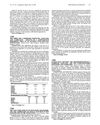 1 citations,
July 2018 in “Current Sexual Health Reports”
1 citations,
July 2018 in “Current Sexual Health Reports” Post-finasteride Syndrome causes lasting negative effects, but more research is needed for treatment and risk evaluation.
 65 citations,
March 1999 in “Urology”
65 citations,
March 1999 in “Urology” Finasteride didn't significantly improve ICPPS symptoms, more research needed.
 December 2021 in “Daehanhanuihakoeji”
December 2021 in “Daehanhanuihakoeji” The traditional herbal formulas Yongdamsagan-Tang and Paljung-san, along with the drug finasteride, can reduce inflammation and may work together without affecting each other's effectiveness against benign prostatic hyperplasia.
August 2024 in “Journal of Controlled Release” A new treatment using hybrid vesicles with gold nanoparticles and finasteride significantly improves hair regrowth for androgenetic alopecia.
April 2017 in “The Journal of urology/The journal of urology” SHH protein helps nerve regeneration in hypertensive rats.
December 2021 in “Faculty Opinions – Post-Publication Peer Review of the Biomedical Literature” Topical finasteride is promising for hair loss with minimal side effects but needs more research and approval.
November 2014 in “PharmaTutor” Finasteride may help postmenopausal women with hair loss but is not effective for all and should be used cautiously in premenopausal women.
 65 citations,
October 1999 in “Journal of The American Academy of Dermatology”
65 citations,
October 1999 in “Journal of The American Academy of Dermatology” Finasteride effectively reduces hair loss by decreasing androgen levels.
 27 citations,
July 2009 in “Experimental and Clinical Endocrinology & Diabetes”
27 citations,
July 2009 in “Experimental and Clinical Endocrinology & Diabetes” Finasteride safely reduces excessive hair growth in women.
 8 citations,
April 2004 in “The Journal of Urology”
8 citations,
April 2004 in “The Journal of Urology” Doxazosin and finasteride negatively affect sexual function in men with BPH.
 30 citations,
January 1997 in “Journal of Dermatological Treatment”
30 citations,
January 1997 in “Journal of Dermatological Treatment” Topical finasteride helps regrow hair and reduce balding without side effects.
 December 2024 in “Frontiers in Neurology”
December 2024 in “Frontiers in Neurology” Testosterone with finasteride improved muscle and bone health in men with spinal cord injury.
 8 citations,
December 2016 in “Revista Medica De Chile”
8 citations,
December 2016 in “Revista Medica De Chile” Finasteride can cause sexual dysfunction, sperm changes, and affect bone density and metabolism.
 42 citations,
December 2015 in “International Journal of Clinical Pharmacology and Therapeutics”
42 citations,
December 2015 in “International Journal of Clinical Pharmacology and Therapeutics” The 0.25% finasteride solution, when applied once a day, effectively reduces scalp DHT, potentially minimizing sexual side-effects linked to a systemic DHT reduction.
August 2021 in “Annales pharmaceutiques françaises” Topical finasteride at 0.25% is effective and has fewer side effects than oral finasteride for hair loss.
 1 citations,
December 2021 in “Androgens”
1 citations,
December 2021 in “Androgens” Testosterone and its metabolites affect brain functions and could help treat neurological disorders.
July 2024 in “Behavioural Brain Research” Long-term finasteride treatment reduces depression and brain issues in obese male rats.
 March 2007 in “Journal of Mazandaran University of Medical Sciences”
March 2007 in “Journal of Mazandaran University of Medical Sciences” Finasteride gel and tablet both have similar moderate effects in treating male hair loss.
 1 citations,
October 2017 in “The Journal of Urology”
1 citations,
October 2017 in “The Journal of Urology” Long-term medication for enlarged prostate might not clearly affect the timing or outcomes of later surgery.
 34 citations,
February 1992 in “The Journal of Clinical Endocrinology and Metabolism”
34 citations,
February 1992 in “The Journal of Clinical Endocrinology and Metabolism” Finasteride and minoxidil together promote hair growth better than either alone.
 70 citations,
August 1995 in “Fertility and Sterility”
70 citations,
August 1995 in “Fertility and Sterility” Finasteride reduces hairiness and androgen levels in women with unexplained excessive hair growth.
 124 citations,
July 2012 in “Archives of Dermatological Research”
124 citations,
July 2012 in “Archives of Dermatological Research” Targeting androgen receptors could be a promising way to treat skin disorders with fewer side effects.
 94 citations,
January 2000 in “The Journal of Clinical Endocrinology and Metabolism”
94 citations,
January 2000 in “The Journal of Clinical Endocrinology and Metabolism” Spironolactone most effective for hirsutism, but has side effects.
 November 2023 in “Journal of Cosmetic Dermatology”
November 2023 in “Journal of Cosmetic Dermatology” Oral minoxidil is more convenient but topical minoxidil improves hair density better.
 May 1999 in “Drugs & Therapy Perspectives”
May 1999 in “Drugs & Therapy Perspectives” Finasteride helps increase or maintain hair in most men but can cause sexual side effects and should not be used by women, especially during pregnancy.
 55 citations,
July 2013 in “Dermatologic therapy”
55 citations,
July 2013 in “Dermatologic therapy” Some dermatological medications can impair male fertility, so consult a doctor before trying to conceive.
 June 2024 in “Georgetown medical review”
June 2024 in “Georgetown medical review” Finasteride treats hair loss but may cause low libido, erectile issues, and depression.
 October 2023 in “Toxicology and Applied Pharmacology”
October 2023 in “Toxicology and Applied Pharmacology” Finasteride is more harmful to male reproductive health than minoxidil.
 March 2024 in “Journal of Endocrinological Investigation”
March 2024 in “Journal of Endocrinological Investigation” Finasteride treatment in rats changed the expression of genes related to psychiatric and neurological functions, and these changes persisted after stopping the drug.
 4 citations,
September 2020 in “Andrologia”
4 citations,
September 2020 in “Andrologia” Oregano extract helps fix testis and sperm damage caused by finasteride.
























